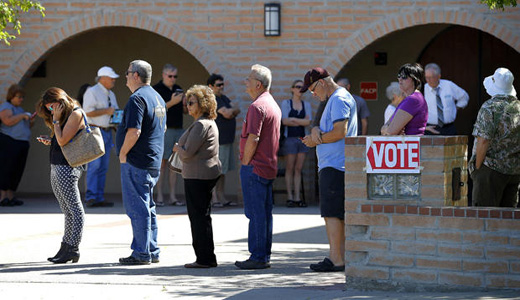
At last there’s some good news: four states have recently passed automatic voter registration laws and at least five have repealed laws that disenfranchised ex-felons.
Announcing the measure enacted in his state last month, Vermont Governor Peter Shumlin said “While states across the country are making it harder for voters to get to the polls, Vermont is making it easier by moving forward with commonsense polices that remove unnecessary barriers and increase participation in our democracy.”
The Vermont law, which calls for eligible voters to be automatically registered when they apply for a driver’s license or state ID, will go into effect next year.
In 2013, the U.S. Supreme Court struck down Sections 4 and 5 of the Voting Rights Act of 1965, provisions that had required federal approval for any changes made to voting procedures in states and jurisdictions having a “pattern” of suppressing the rights of minority voters.
With Sections 4 and 5 gone, 34 states now have laws requiring voters to show identification at the polls and more have cut back early voting hours. It has been conclusively shown that these two measures hit poor people and minorities the hardest. Many do not have the required forms of identification and lack easy access to birth certificates or other documents to obtain them.
Furthermore, many working people cannot get off from work to vote on any given day and need early voting to exercise their franchise.
States passing voter suppression laws are overwhelming those under the thumb of right wing politicians whose goal is to keep the electorate as white and as affluent as possible.
For example, last year North Carolina repealed same day voter registration, reduced the early voting period and enacted an extremely burdensome voter identification requirement. Despite massive protests, the new law was upheld by a federal judge several weeks ago. That ruling has been appealed by the state NAACP and other groups.
On the other hand, earlier this year, President Obama addressed the Illinois General Assembly and called for automatic voter registration through driver license applications. He encouraged states to make this “the new norm across America.”
Several states, mostly with large Democratic Party majorities, have bucked the general trend and have followed President Obama’s admonition.
Vermont joins Oregon, California, and West Virginia in adopting an automatic voter registration law.
Campaigns to win similar laws through legislative action or ballot initiatives are currently underway in Illinois, Maryland and Ohio.
Democratic legislators in New Jersey included automatic voter registration in a bill revamping the state’s election system last year, but Republican Governor Chris Christie vetoed it.
Meanwhile, last month Virginia Governor Terry McAuliffe issued an executive order restoring voting rights to ex-felons and the Maryland legislature granted voting rights to felons after they have completed their terms of incarceration.
Also, Wyoming enacted a bill requiring the department of corrections to issue a certification of restoration of voting rights to certain non-violent felons after completion of sentence and Delaware eliminated the five-year waiting period before voting rights are restored.
Furthermore, in 2009, the State of Washington restored the right to vote to felons who completed their sentences, while requiring them to re-register to vote.
Because of the bias endemic in the U.S. justice system, the vast majority of felons are minorities.
To shrink the strength of minority voters, in recent years, Kentucky, South Carolina, Florida, Iowa, Tennessee and other states enacted measures that either stripped ex-felons of voting rights they previously had or greatly restricted those rights.
Nevertheless, some elected officials, such as those in Vermont, are working to support, not hinder, the right of all Americans to vote.
When the new Vermont voting rights bill passed, the state’s Secretary of State Jim Condos said “I believe voting is a sacred right – one we must protect and encourage by removing unnecessary barriers.”
Photo: While many states are making it more difficult to vote by requiring tough-to-get identification cards, ending early voting, and cutting the number of polling places – measures that result in long lines like this one in Arizona – several states recently announced measures to make voting a lot easier. | AP












Comments